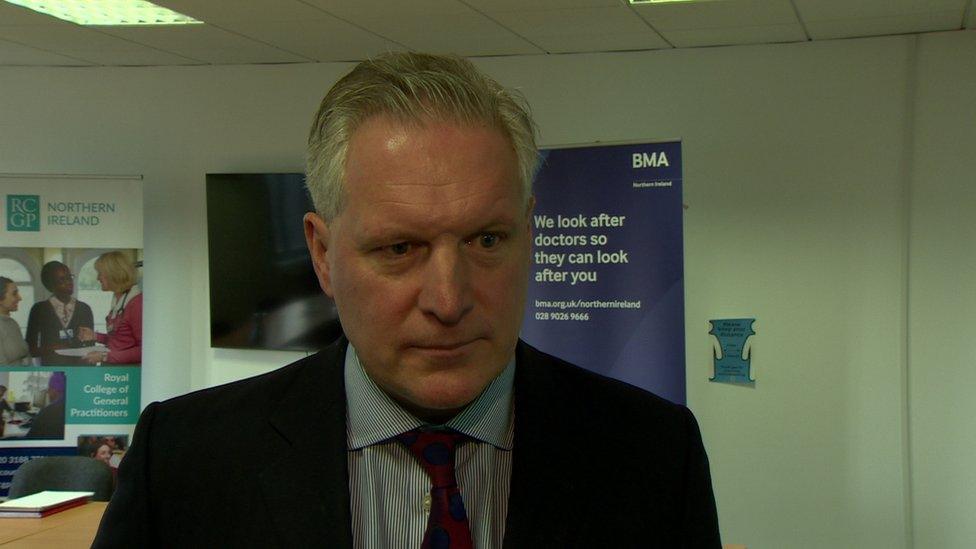NI health service: GP leaders warn of 'relentless workload'
- Published

GP leaders have said if action is not taken soon to stabilise general practice the consequences for patients will be severe.
Doctors representing the Royal College of GPs (RCGPNI) and the British Medical Association GP Ccommittee were speaking after addressing local politicians.
Dr Alan Stout, committee chair, said GPs have "consistently highlighted the problems".
He warned there are not enough GPs coming into the profession.
He also said an increasing number are choosing to retire early and there is a "huge and relentless workload across the system".
Speaking to BBC News NI, Dr Stout said this was impacting the quality of the service as GPs just cannot cope with current demand.
In the absence of a Stormont Executive, there are lots of talks happening behind the scenes between health leaders and politicians to try and introduce measures which would allow change to happen.

Dr Alan Stout said GPs have "consistently highlighting" problems they are facing
Dr Ursula Mason, RCGPNI chair, said there is a great deal of support and ongoing talks to try and stabilise general practice.
She said: "I would like to think that our elected representatives are going to work more closely with the permanent health secretary to enable him to make decisions that are important for the future sustainability of general practice and the health service as a whole.
"It is vitally important that in the absence of an executive that he's given as much opportunity as possible around transforming services as much as possible."
With practices closing and funding squeezed, GPs said a recurrent budget and leadership is critical.
GPs also told politicians that their contracts need to change and become less bureaucratic so they have more time to spend with patients.
There was also emphasis on the need for a long-term workforce plan across the system.
Both colleges said there is a need to know how many GPs, surgeons and nurses are required in the future to meet demographics.
Dr Mason said they repeated their call for elected representatives to get back to the table and do the job they were elected to do, for the sake of the health service.
Sinn Féin's spokesperson on health, Colm Gildernew, said GPs had highlighted the pressures they faced but "there is no ability for us to address many of those issues in the way we could with an executive, with an assembly".
Mr Gildernew said Stormont needed to invest in the health workforce and agree multi-year budgeting to allow for longer term planning.
Meanwhile, Alliance Party MLA Paula Bradshaw said it was deeply frustrating that without a health minister and health committee it was difficult to "grapple" with the issues raised during the meeting.
"We all recognise that without an executive a lot of the key issues that are raised with us by our patients in here today cannot properly be resolved until we have an executive functioning," she explained.
All five main political parties attended the meeting.